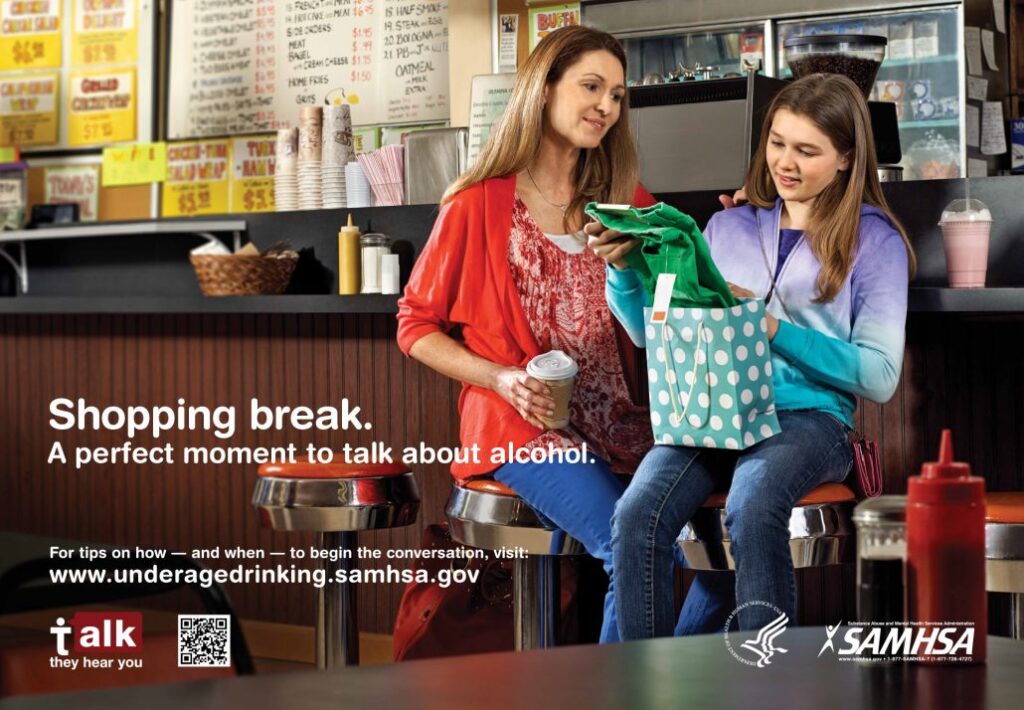April is Alcohol Awareness Month
Talking to your child at an early age about drinking is the first step toward keeping them alcohol-free. But as they enter junior high and high school, the pressure to try alcohol increases. It’s important to continue the conversation throughout adolescence.
Talking often builds an open, trusting relationship with your child.
Children are more likely to avoid drinking when they have a strong, trusting relationship with their parents. Get into the habit of chatting with your child every day. It will make it easier to have serious conversations about things like alcohol, and will make your child more comfortable coming to you for advice.
Lots of little talks are more effective than one “big talk.”
Sitting down for the “big talk” about alcohol can be intimidating for both you and your child. Try using everyday opportunities to talk— in the car, during dinner, or while you and your child are watching TV. Having lots of little talks takes the pressure off trying to get all of the information out in one lengthy discussion, and your child will be less likely to tune you out.
When you do talk about alcohol, make your views and rules clear.
Take the time to discuss your beliefs and opinions about alcohol with your child. Be honest and express a clear, consistent message that underage drinking is unacceptable. When they feel that you’re being real and honest with them, they’ll be more likely to respect your rules about underage drinking.
As children get older, the conversation changes.
What you say to a 9-year-old about alcohol is different from what you say to a 15-year-old. Children also can’t learn all they need to know from a single discussion. Make sure that the information you offer your child fits their age. As they get older, you can give them more information and reinforce your rules.
Remember that the conversation goes both ways.
Although talking to your child about your thoughts about alcohol is essential, it’s also important to hear their point of view. Give your child the opportunity to ask you questions, and listen to what they have to say. Children who have parents who listen to their feelings and concerns are more likely to say “no” to alcohol.
What you do is just as important as what you say.
In addition to talking often with your child about alcohol, it’s important to set a good example. If you choose to drink, you can positively influence your child by drinking in moderation and NEVER driving when you’ve been drinking. Be aware of where you keep your alcohol, and always remind your child that the alcohol in your house is off-limits.

Facts About Fentanyl
Volunteer Opportunities
There are a variety of volunteer opportunities at awesome nonprofits throughout Westchester and Putnam Counties. To view these opportunities, please check out Volunteer New York!
| Weekly Spotlight Family Support Groups From our partners at Drug Crisis in Our Backyard, weekly Spotlight Family Support Groups, held virtually every Tuesday and Wednesday via Zoom. Spotlight on Recovery is a Family Educational and Support Group for families struggling with a loved one misusing substances. For more information, click here. The Parent Support Network The Parent Support Network is a program of The Youth Mental Health Project that seeks to provide support for parents and guardians who are concerned about the mental health of their children (ages 1 -25) through confidential, peer-to-peer meetings. For a list of upcoming virtual meetings, click here. NAMI Westchester The families and members of NAMI Westchester are here to help! They offer understanding to anyone concerned about mental illnesses and the treatment of mental illness. To view their calendar, click here. April 5: Setting Healthy Boundaries in a Relationship Learn how to express your own needs without guilt & strike a healthy balance between caregiving and self-care with a licensed therapist. Register now. April 11 – Vaping and Marijuana: What Parents Must Know Register now. April 13: Understanding Suicide Talking about suicide is the key to prevention. Register now. April 19: Understanding Anxiety Occasional anxiety is an expected part of life, but anxiety disorders involve more than temporary worry. Register now. April 20: Virtual Overdose Prevention Training Naloxone is a prescription medicine that reverses an overdose by blocking heroin or other opioids in the nervous system for 30-90 minutes. Naloxone is administered by injection or intranasal. Following training, participants receive a kit by mail. Presented by our partners at Drug Crisis in Our Backyard. Register by email: ssal@drugcrisisinourbackyard.com April 24: Drug/Alcohol Stash Compartments, Clothing and Other Products This webinar will highlight clothing used to conceal “your valuables” – from stash hats, shirts, shoes and other clothing items to false containers, compartments, and much more. The one hour webinar will be packed with information about common locations, and where to purchase these items, including the Internet. Register now. April 27: Empowering Loved Ones Understanding how to effectively support friends and family members with mental health disorders is essential. Register now. |

